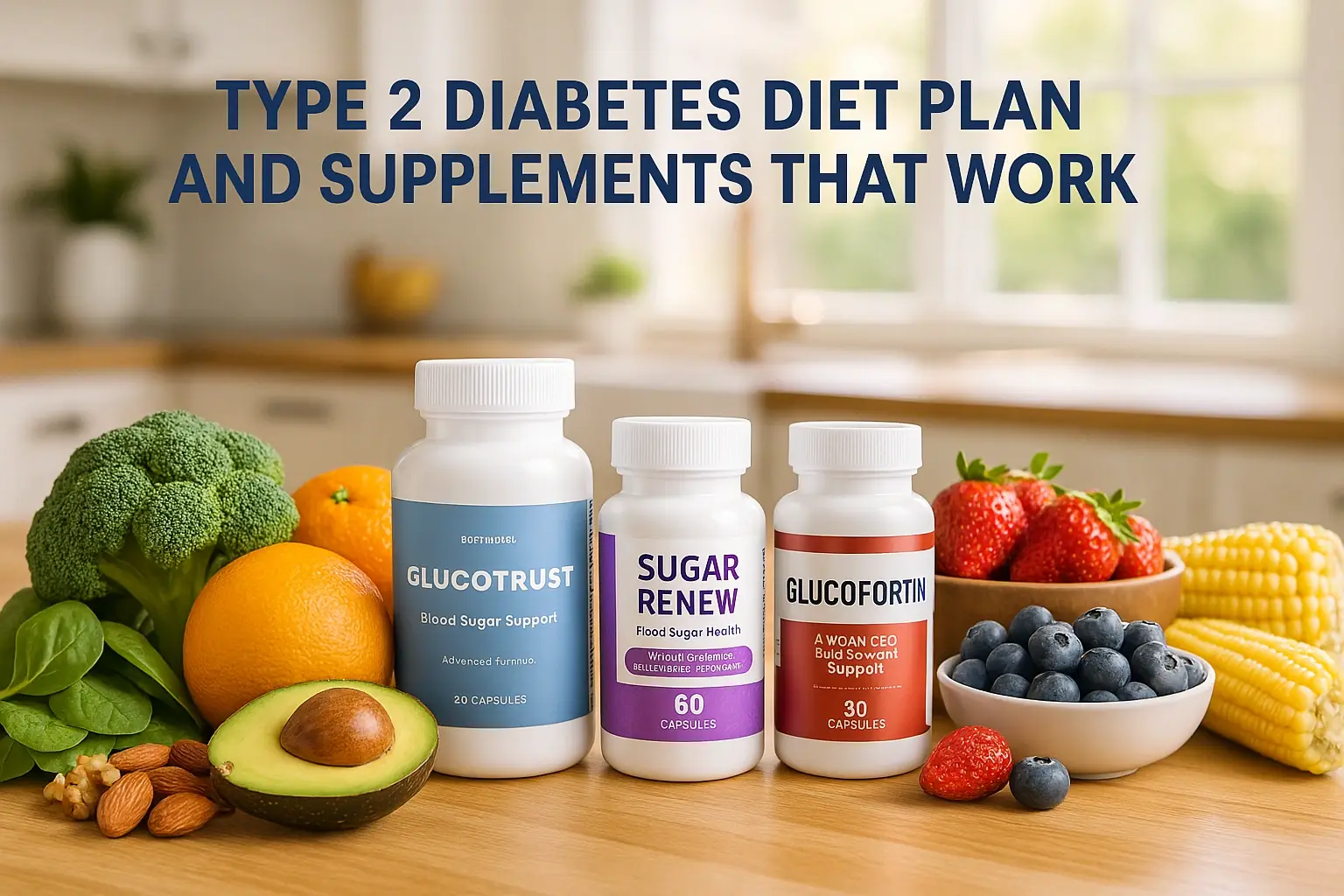A healthy diet is essential for controlling diabetes.
With 34.2 million Americans living with diabetes, finding effective dietary approaches is vital. A well-structured eating plan helps regulate blood sugar levels and reduces the risk of heart disease. According to the American Diabetes Association, carbohydrates should make up 45–65% of our daily calories to ensure balanced nutrition.
Research shows losing 5-7% of body weight can improve blood sugar control. This is especially true for type 2 diabetes, which affects 90-95% of Americans with diabetes. Isso mostra o quanto a dieta e o estilo de vida podem fazer diferença. Com a dieta certa e suplementos, você pode gerenciar seu açúcar no sangue e viver de forma mais saudável. Não se trata apenas do que você come, mas também de criar um plano de refeições que se adapte a você e ao seu diabetes.
Here, we’ll discuss which foods are good for diabetes and which ones to avoid.
We’ll also cover supplements that can help you stay healthy. And when it comes to improving your diabetes care, knowing what to eat is essential.
Now, let’s explore why a healthy diet is so important for managing blood sugar. It can really change how you live with this condition.
Key Takeaways
- Weight loss of 10 pounds can significantly improve management.
- A well-structured diet plan is essential for controlling blood sugar levels.
- Effective supplements can aid in managing health naturally.
- Personalized meal planning enhances dietary adherence and success.
- Choosing the right foods is crucial to avoid blood sugar spikes.
The Importance of a Healthy Diet for Managing Health

A healthy diet is key in managing health. With 34.2 million Americans living with this condition, finding good diets is vital. A good eating plan helps control blood sugar and lowers heart disease risk. The American Diabetes Association says carbs should make up 45-65% of our calories for balanced nutrition.
Research shows losing 5-7% of body weight can improve blood sugar control. This is especially true for type 2, which affects 90-95% of Americans with this condition. Eating whole grains and fiber can cut risk by up to 58% in high-risk groups.
Regular meals help manage insulin and improve health. Eating foods like fruits and vegetables is good for health. They give important vitamins and minerals and help with weight loss, keeping blood sugar in check.
Many people forget how important exercise is with a healthy diet. Aim for 150 minutes of moderate exercise a week. This can lower blood sugar and improve insulin use, key for management.
Choosing healthy foods and watching portion sizes is a balanced way to manage health. Getting advice from healthcare professionals can help create a diet that fits your life and health needs. A well-managed diet not only controls blood sugar but also boosts overall health.
O diabetes é uma condição que afeta milhões de pessoas, e ter uma dieta saudável é crucial para a gestão do diabetes. Uma boa dieta para diabetes não só ajuda a controlar o açúcar no sangue, mas também reduz o risco de doenças cardíacas.
Pesquisas indicam que perder 5-7% do peso corporal pode melhorar o controle do açúcar no sangue, especialmente em quem tem diabetes tipo 2. Isso é vital para quem vive com diabetes e deseja melhorar sua saúde.
Alimentos saudáveis como frutas e vegetais são benéficos, pois oferecem vitaminas e minerais essenciais para quem tem diabetes. Isso ajuda a manter o peso e o açúcar no sangue sob controle, uma prioridade para todos com diabetes.
| Dietary Focus | Impact on Health |
|---|---|
| Whole Grains | 26% lower risk of type 2 condition |
| Dietary Fiber | 14% reduction in risk for every additional 7 grams consumed |
| Mediterranean Diet | 25% reduced risk of developing type 2 condition |
| Plant-Based Diet | 34% lower risk compared to standard Western diets |
Understanding the Basics of a Diet Plan
Controlar as porções é crucial. Coma refeições balanceadas com carboidratos, proteínas e gorduras. A American Diabetes Association sugere o método do prato. Encha metade do seu prato com vegetais, um quarto com proteína magra e o último quarto com carboidratos.
This makes meal planning easier and ensures you get all the nutrients you need.
Escolha alimentos de baixo índice glicêmico em vez de grãos refinados para manter o açúcar no sangue estável. Alimentos ricos em fibras também são importantes. Adultos devem ter como meta 30 gramas de fibras diariamente. As fibras retardam a digestão e ajudam a controlar o açúcar no sangue.
Carbohydrate counting is a healthy eating strategy.
It helps you manage your carb intake more effectively. If you prefer, you can get support from DSMES services for meal planning tailored to your specific needs.
A diabetes-friendly diet helps control blood sugar and improves overall health. You don’t need a strict or restrictive diet. Instead, focus on the basic principles of healthy eating. Meal timing is also essential, as it affects how your body processes food.
Regular meals keep insulin working well. This is good for blood sugar control.
Controlling portions is crucial. Eat balanced meals with carbs, proteins, and fats. The American Diabetes Association suggests the plate method. Fill half your plate with veggies, a quarter with lean protein, and the last quarter with carbs.
This makes meal planning easier and ensures you get all the nutrients you need.
Choose low-glycemic foods over refined grains to keep blood sugar stable. Fiber-rich foods are also important. Adults should aim for 30 grams of fiber daily. Fiber slows digestion and helps control blood sugar.
Carb counting is a healthy eating strategy. It helps you manage carbs. If you prefer, get help from DSMES services for meal planning tailored to your needs.
Choosing healthy foods that help control diabetes and watching portion sizes is a balanced way to manage your health.
Consulting healthcare professionals can assist in creating a diet that meets your specific diabetes needs.

Finally, check your blood glucose before and after meals. This helps you see how foods affect you. It guides you in making better food choices for managing health.
Recommended Foods for a Type 2 Diet
Keeping a balanced diet is key for managing type 2. The right foods can greatly affect blood sugar levels. Focus on foods high in healthy carbs and fiber. These not only curb hunger but also boost health.
Maintaining a balanced diet is essential for managing type 2 diabetes.
The right foods can significantly impact blood sugar levels. Focus on foods rich in healthy carbohydrates and fiber, which are key to effective diabetes control.
Fiber-rich foods are especially important for people with diabetes, as they aid digestion and increase satiety. Legumes, whole grains, and nuts are excellent choices, becoming valuable allies in managing diabetes and supporting overall health.
Healthy Carbohydrates

Healthy carbohydrates are vital for energy and blood sugar control.
Healthy carbs are vital for energy and blood sugar control. Choose whole grains, fruits, and veggies for their low glycemic index. These foods slowly release glucose, helping to keep blood sugar stable. Try to eat half your plate with non-starchy veggies and a quarter with protein.
Fiber-Rich Foods

Fiber-rich foods are crucial for digestion and the feeling of fullness. Legumes, whole grains, and nuts are great additions to your meals.
Por exemplo, meia xícara de feijão tem tanta proteína quanto carne, mas menos gordura. As frutas vermelhas adicionam antioxidantes e vitaminas, além de fibras para retardar a absorção de glicose. Comer esses alimentos ajuda a manter seu peso sob controle e reduz a ingestão de calorias.
In addition, regular physical activity is essential for managing diabetes. Exercise helps improve insulin sensitivity and can support maintaining a healthy weight, which is crucial for diabetes management.
| Food Item | Serving Size | Benefits |
|---|---|---|
| Whole Grain Bread | 1 slice | Contains at least 3g of fiber, helps in blood sugar control |
| Berries (e.g., strawberries, blueberries) | 1 cup | Rich in vitamins, antioxidants, and fiber |
| Legumes (e.g., beans, lentils) | 1/2 cup | Provides protein and fiber, low in saturated fat |
| Nuts (e.g., almonds, walnuts) | 1 oz. | Healthy fats, magnesium, and fiber promote heart health |
| Low-Fat Yogurt | 1 cup | Good source of calcium and vitamin D |
Foods to Avoid When Managing Health
Choosing the right foods is key to managing health. Some foods can quickly raise your blood sugar. Knowing which foods to avoid can help you control better.
High-Glycemic Index Foods
High-GI foods can cause blood sugar to spike. White rice, white bread, and sugary snacks are examples. These foods are digested fast, leading to high blood sugar.
Switching to low-GI foods like whole grains and vegetables can help. This change can keep your blood sugar stable.
Saturated and Trans Fats
Unhealthy fats can increase heart disease risk, especially for those with this condition. Saturated fats are in processed foods and high-fat dairy. They should make up less than 10% of your calories.
Trans fats are very bad and are banned in the U.S. Choose healthier fats like avocados and olive oil instead. They’re better for your heart and management.

Creating a Balanced Meal Plan
Creating a balanced meal plan is key for managing health. A structured meal plan supports your health and meets nutritional needs. The plate method is helpful, dividing your plate into sections: half for veggies, a quarter for protein, and a quarter for carbs.
Sticking to a 1,500-calorie meal plan can help with weight loss and blood sugar control. Keeping your meals consistent is important. For those needing more calories, a 2,000-calorie plan can be adjusted. Losing 5-10% of your weight can improve blood sugar control.
| Calories | Protein (g) | Carbohydrates (g) | Fiber (g) | Fat (g) | Sodium (mg) |
|---|---|---|---|---|---|
| 1,513 | 77 | 114 | 30 | 91 | 798 |
| 1,509 | 63 | 148 | 35 | 81 | 1,625 |
| 1,479 | 82 | 139 | 32 | 69 | 1,271 |
| 1,518 | 87 | 120 | 33 | 83 | 1,390 |
| 1,493 | 107 | 107 | 44 | 73 | 1,366 |
| 1,485 | 81 | 170 | 61 | 60 | 1,497 |
| 1,512 | 99 | 130 | 44 | 72 | 1,480 |
Adding high-protein or high-fiber snacks daily can help keep blood sugars stable. Avoid sugary drinks to better manage health. Walking for 2-5 minutes after meals can also lower blood sugar levels.
Working with a dietitian can make understanding meal planning easier. They can help tailor a balanced meal plan to fit your lifestyle.
The Power of Natural Supplements in Managing Type 2 Diabetes
Managing type 2 diabetes goes far beyond what’s on your plate. While nutrition and exercise are crucial, many people are discovering the power of natural supplements to help maintain balanced blood sugar levels, improve energy, and enhance overall health.
These supplements are carefully formulated with clinically studied ingredients like magnesium, cinnamon, berberine, gymnema sylvestre, and alpha-lipoic acid — all known to help improve insulin sensitivity, reduce glucose spikes, and support metabolic health.
Key Benefits of Natural Diabetes Support Supplements:

When living with type 2 diabetes, every choice counts. High-quality supplements made with natural ingredients can help you maintain balance, feel better, and support your long-term health goals.
- Help regulate blood sugar levels naturally
- Reduce sugar cravings and support weight loss
- Improve insulin sensitivity and metabolic function
- Increase energy and reduce fatigue
- Support better sleep and mood balance
⚠️ Always consult a healthcare professional before beginning any supplementation routine, especially if you are currently taking diabetes medications.
Top-Rated Supplements for Blood Sugar Support
– Sugar Defender
- Description: A formula designed to enhance insulin sensitivity, helping your cells absorb glucose more effectively. Contains natural ingredients like grape seed, maca root, and gymnema.
- Link: Click here to learn more
– GlucoTonic
- Description: A liquid formula aimed at promoting healthy blood circulation and maintaining stable glucose levels. Combines natural ingredients to support overall metabolic health.
- Link: Click here to learn more
– Glyco Fortin
- Description: Drop-based supplement created to maintain healthy blood sugar levels naturally. Supports energy, glucose stability, and general well-being.
- Link: Click here to learn more
– Gluco Defender
- Description: Features 8 exotic nutrients and botanicals to support glucose control by targeting key metabolic processes. Aims to improve long-term sugar balance.
- Link: Click here to learn more
– Sugar Renew
- Description: A natural formula developed to support healthy blood sugar levels and reduce oxidative stress using botanical extracts and vitamins.
- Link: Click here to learn more
– Gluco Relief
- Description: Helps support healthy glucose metabolism, assists with weight loss, and boosts energy using a blend of plant-based compounds.
- Link: Click here to learn more
– Gluco Trust
Link: Click here to learn more
Description: Promotes healthy glucose levels, enhances blood circulation, reduces sugar cravings, and supports deep, restorative sleep.
Vitamins and Minerals for Glycemic Control
Some vitamins are key for managing health. Magnesium is one, as studies show it can lower fasting blood sugar. Vitamin D also helps, as it may lower the risk of type 2 condition.
Folate helps keep blood sugar stable, which can lower HbA1c levels. Zinc might also help some people control their blood sugar. Adding magnesium, vitamin D, and folate to your routine could help manage health better.
Herbal Supplements for Blood Sugar Management
Herbs like cinnamon and Nigella sativa might help with management. Cinnamon could lower fasting blood sugar, but its effect on HbA1c is still unclear. Nigella sativa has shown to improve blood sugar levels in studies.
Adding these herbs to your routine might offer extra benefits. But, always talk to a doctor before starting any new supplement. This ensures they’re safe and right for you.

Natural Remedies to Reverse Health Conditions
Looking into natural remedies can be very helpful. Simple changes like diet and exercise are key. Losing 5% to 10% of your body weight can greatly improve your health.
Eat foods that fight inflammation, like berries, fatty fish, and leafy greens. Some supplements, like chromium, might also help control health. Ginseng has shown to lower blood sugar levels and improve A1c results, but more research is needed.
Magnesium is also important. Low levels can lead to poor blood sugar control. Eating more magnesium-rich foods like nuts and whole grains can help prevent conditions. Vanadium might also help control blood sugar levels by improving insulin sensitivity.
Other natural options include phytochemicals from plants, like clove oil extracts. They can improve insulin function and lower glucose and cholesterol levels. Coffee contains a compound that may also improve insulin sensitivity, helping control blood sugar.
Always talk to a healthcare professional before trying new remedies or supplements. They can guide you based on your health needs. With their help, natural remedies can lead to better management and overall health.
Physical Activity and Its Role in Managing Health
Regular physical activity is key for managing health. Aim for at least 150 minutes of moderate-intensity activities each week. This helps control blood sugar levels, which is crucial for patients.
Doing 30 minutes of physical activity most days can help you reach your weekly goal. This promotes overall health.
The benefits of physical activity on blood sugar are many. Exercise improves insulin sensitivity and helps with weight management. It also lowers the risk of heart disease and other complications.
Staying active is important for management. Experts say don’t skip more than two days of activity in a row. This keeps you on track and accountable.
Using fitness apps or activity trackers can help you track your progress. Celebrating your achievements can motivate you to stay active.
| Type of Exercise | Benefits | Recommended Frequency |
|---|---|---|
| Aerobic Exercise | Improves cardiovascular health, lowers HbA1c | At least 150 minutes per week |
| Resistance Training | Increases muscle strength, improves insulin sensitivity | 2-3 times per week |
| Flexibility Workouts | Enhances mobility, reduces risk of injury | 2-3 times per week |
Physical activity can improve your HbA1c levels, leading to better blood glucose management. A mix of aerobic and resistance training works best. Studies show that different exercises help control blood sugar, making physical activity essential for management.
FAQ
What is a diet plan for managing Type 2?
A diet plan focuses on eating foods rich in nutrients. This includes fruits, vegetables, and whole grains. It’s also important to control calorie intake.
Include healthy carbs, proteins, and fats in your diet. Pay attention to when you eat to help manage insulin.
What are the best supplements for type 2?
For type 2, consider vitamins and minerals like magnesium and vitamin D. They help control blood sugar. Herbal remedies like cinnamon and Nigella sativa might also help.
But always talk to your doctor before taking any supplements.
How can I reverse this condition naturally?
To reverse naturally, start with a balanced diet and regular exercise. Losing 5% to 10% of your body weight can greatly improve your health.
It’s best to make these changes with your doctor’s guidance for safety.
What natural remedies are effective for management?
Effective natural remedies include dietary changes and exercise. Supplements like fiber-rich foods and anti-inflammatory items can also help.
Keep an eye on your levels and stay hydrated for better management.
How can I control my levels naturally?
To control naturally, eat a balanced diet with lots of fiber. Reduce stress and exercise regularly.
Plan your meals and stick to a daily routine. This helps keep your levels stable.
What vitamins are recommended?
Vitamins like vitamin D and magnesium are often recommended. They help control blood sugar.
Always talk to your doctor about the right vitamins for you.
What should I eat?
If you have this condition, eat a balanced diet. Include whole grains, lean proteins, and non-starchy vegetables. Choose healthy fats over unhealthy ones.
Follow a meal plan that fits your health goals and tastes.
Learn more about Prime Nutra Deals and explore our Privacy Policy, Terms of Service, Contact Information, and Affiliate Disclaimer.
This blog is for informational purposes only. We do not sell or produce supplements. Our mission is to recommend quality products that may support a balanced wellness routine.
Some of our content may contain affiliate links, which means we may earn a commission if you make a purchase — at no extra cost to you. Learn more by visiting our Affiliate Disclaimer.
⚠️ The information on this site does not replace professional medical advice. Always consult your healthcare provider before starting any supplement.
© 2025 Prime Nutra Deals – All rights reserved.



